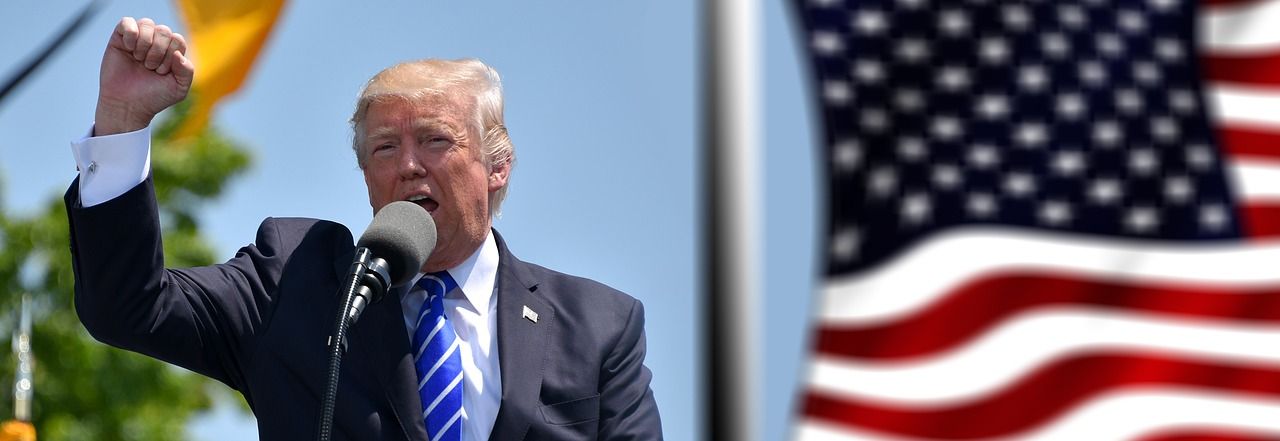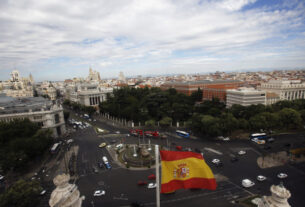
“Who is to decide which is the grimmer sight: withered hearts, or empty skulls?” -Honoré de Balzac
For understanding the context of social life, Honoré de Balzac was a master. Minutely analytic in his scrutiny of society, he delicately lay bare every stratum of culture with the precision of an archeologist. Brushing the “dirt” from every “artifact,” his books combined (as Victor Hugo remarked at his funeral) “observation and imagination.”
It was an ideal but too-rare combination. Still, desperately, America needs another Balzac today. Despite so much apt criticism of an incoherent US presidency, millions of Americans continue to regard Donald Trump as an acceptable or even exemplary leader.
How can this be happening in a presumptively informed and democratic American society? In response, we could very easily throw up our hands and exclaim (together with ancient philosopher Tertullian), Credo quia absurdum, “I believe because it is absurd.” For a more serious response, however, we should first examine the wider American society from which this relentlessly conning president was drawn.
To fruitfully extend the illuminating Balzac metaphor, it is high time to “brush the dirt” from all still-revealing “artifacts.”
What might we expect to discover? At a minimum, the results of any such examination should be decipherable and straightforward. If properly executed (that is, if carried out with proper attention to the long-settled criteria of scientific investigation), we could quickly discover that Americans all-too-frequently abhor any genuine learning. Although this nation surely does place a very high value on every manner of “practical” achievement (e.g., smart phones, Facebook, Snapchat, Twitter, self-driving cars, automatic guns, etc., etc.), it is only because these diverse products are expected to enhance the banal circumstances of American “mass.”
In essence, before learning and intellect can ever be valued for themselves in the United States – a condition which is so clearly required for proper governance – Americans will first need to think far beyond glittering and distracting technologies.
What else might be learned from a “Balzac-like” assessment of dissembling US presidential moments? In some respects, the “Trump Phenomenon” is not utterly unique. Although less rancorous, cantankerous and blatantly foolish, more than a few incapable and dishonest US presidents have been endured during America’s endlessly acrimonious past. At the same time, especially because his own conspicuous debilities are coupled with a “nuclear button,” Donald Trump is more tangibly dangerous than anyone of his injurious predecessors.
Vastly more dangerous.
Soon, however, we must return to deeper explanations. In all likelihood, almost by definition, a contemporary Balzac would look more closely at the broader society from which this American president was drawn and from which he was catapulted to nuclear command authority. Here, soberly, all must finally confront a cheerlessly trivialized social order, a generally dumbed-down amalgam of individual citizen souls yearning to “follow the crowd.”
Ever yearning.
Even in this pervasively anti-thought society, the core problem is not that the “average American” knows too little about matters of consequence.
Rather, it’s that he or she wants to know very little.
Incontestably, these same limiting traits are characteristic of Donald J. Trump. Expressed in more axiomatic mathematical terms, one is the inevitable reciprocal of the other.
Not by happenstance did Trump rise to power in a country so flagrantly proud of its historical and cultural illiteracy. The fact that this US president never reads anything – literally, never, ever – is not widely taken by Americans as a significant liability. On the contrary, the obliging American mass reserves notably few intellectual expectations for its leaders. Indeed, for many voters, ostentatiously, any obvious intellectual disinterestedness is taken as an enviable presidential asset.
Credo quia absurdum, said the ancient philosopher. Once upon a time, when some calculable number of Americans still sought to read challenging books and consider variously complex ideas, Ralph Waldo Emerson urged his fellow citizens to embrace “plain living and high thinking.” Today, this earlier American plea for improved personal and social equilibrium has been casually cast aside. If it were more widely recognized, Americans would then be “assured” that any well-reasoned pleas for consequential reform should only be ridiculed.
Under the aegis of President Trump’s continuously “rotating” senior appointees, matters will only get worse. Nonetheless, growing legions of US citizens acknowledge no real problem with their overtly anti-education president, even one whose proposed “solution” to gun violence in the schools is to randomly arm teachers (because they are “more loving” than police) and to “fight back” with still more guns. In part, at least, such an ominous indifference to intellect and science can be traced to America’s unrelieved barrage of crude and voyeuristic entertainments, many of which center on sadism, torture, murder and (these days especially) a cheerlessly corrosive public discourse.
Always, in the Trump Era, this discourse is laced with utterly baseless rancor and with conspicuously dreary profanity.
Always, in this American White House, science and reason represent merely an annoying impediment to free-floating human hostilities.
It’s time for candor. Earlier, Donald Trump had promised, at one of his more hideous Goebbels-style “rallies,” to protect a nonexistent Article of the US Constitution. Even then, however, his unhidden historical ignorance was glossed over by supporters as unimportant. Still, it represented another humiliating Trumpian symptom of America’s much wider and more deeply insidious national “pathology.” While his followers were generally correct that this president was entirely willing to “speak his mind,” they seem untroubled by the too-obvious corollary.
There was no underlying mind for him to speak.
“What the mob once learned to believe without reasons,” queries Friedrich Nietzsche in the Fourth Part of his Zarathustra, “who could overthrow that with reasons?”
Nietzsche, as usual, had understood splendidly, deeply. He reflected (also in Zarathustra) that “When the throne sits upon mud, mud sits upon the throne.” Disregarding the millions who (“with reasons”) still refuse to renounce a glaringly unhinged presidency, Donald Trump never ever attempts to understand that American history deserves its proper pride of place.
This is because the American president is himself utterly ignorant of America’s history and founding principles.
How many Americans who energetically champion “gun rights” have paused to consider that the Founding Fathers were not expecting automatic weapons? How many can sincerely believe that the Founders would have wanted 350 million privately-held weapons, including huge private arsenals that can kill hundreds in minutes and are sometimes in the hands of citizens living with variously advanced stages of dementia?
Could any argument for “Second Amendment Rights” be more starkly disingenuous than those that put literally unimaginable sentiments into the mouths of 18th-century revolutionaries?
Can anyone reserve a legitimate intellectual right to believe that the Second Amendment embraces originally-inconceivable sorts of firearm? How many “educated” Americans bother to learn that their early eighteenth-century Republic was the direct religious heir of John Calvin and the lineal philosophical descendant of John Locke and Thomas Hobbes? How many can appreciate that the fearful Hobbesian “state of nature” described in Leviathan – a “state of war” or “war of all against all” (bellum omnium contra omnes) – was deemed insufferable by the seventeenth-century English philosopher because there “…the weakest has strength enough to kill the strongest.”
Hobbes strongly cautioned against any social order that might wittingly or unwittingly create this “dreadful equality.” After all, following such creation, “…the life of man (would necessarily be) solitary, poor, nasty, brutish, and short.” Evidently lost on this president, too, is the ongoing relevance of Hobbesian thinking to the proliferation of nuclear weapons. Why else would Trump be actively undermining the already-fragile nuclear arms control regime, even to the extent of abrogating critical US treaties with Russia?
One still-whispered explanation is that this US president is a real-life “Manchurian Candidate,” but a more plausible answer is that he has no intellectual grasp of how best to support American survival in the steadily nuclearizing state-of-nature.
None at all.
For Trump, going back to “nature,” both nationally and internationally, could represent a positive or welcome development. More exactly, in this president’s alarmingly disjointed views of the world, (ones wherein “might makes right”) regression could sometime become an agreeable part of “making America great again.”
Credo quia absurdum. “I believe because it is absurd.”
There is more. This is hardly the first time in modern history that a “crowd” has loved to chant gibberish in belligerent chorus. For a particularly worrisome example, we need only recall the ritual cries of Joseph Goebbels at the Nuremberg Rallies before the War. What Goebbels did expertly instruct, with a shrill and perverse genius – an instruction now capably learned by Donald Trump – is that the bigger the lie, the more believable it can become. At first, the lie doesn’t seem to make any sense. But if one leads chants often enough against some “crooked” opponent or another, fewer will expect to find any “crookedness” on the chanting side.
Such devious “logic” makes no discernible sense. Still, it continues to work well for US President Donald Trump. Absurdly well.
“Intellect rots the brain,” warned Goebbels.
“I love the poorly educated,” echoed candidate Donald Trump in 2016.
Not much calculable difference here. Both Goebbels and Trump were effectively on the same page.
In the past, Mr. Trump, with nary a hint of painstaking analysis, blithely encouraged more countries to acquire their own nuclear weapons (e.g., Japan and South Korea). Immediately, this incomprehensible urging should have signaled a too-willing incapacity to figure out certain complex strategic problems. At a minimum, the president’s earlier encouragements were spawned by his apparent unawareness that possession of nuclear weapons does not ipso facto create credible nuclear deterrence postures.
Not at all.
In the pertinent language of nuclear strategic theory – a language with which I have personally been intimate for over fifty years – in Princeton, Washington and Jerusalem – the Trump fallacy has a specific name.
It is referenced by specialists as the “porcupine theory.”
This prickly metaphor obtains because these violators of strategic logic falsely equate nuclear weapons states with porcupines, presuming that just as the quill-endowed critters will leave each other alone in the forest, so too would nuclear weapon states steer clear of each other in the unsteady interstices of anarchic world politics.
In the end, US presidential selections are too often shaped by primal disfigurements. Many of America’s cumulative political ambitions remain integrally bound up with distressingly embarrassing simplifications and with resoundingly stupefying clichés. The elaborately welcomed appearance of Duck Dynasty as a principal “speaker” before Mr. Trump’s Republican National Convention should already have represented the reductio ad absurdum of a declining civilization.
Yet, it was not generally criticized. Not at all.
But it was consistent – and without causing any electoral disadvantage – with Donald Trump’s terminally proud aversion to refinement, syntax, intellect and meaningful learning. At even much deeper levels, it was expressive of America’s general celebration of low-level and degrading public distractions. For this US president, whose crude sentiments were unhidden, there was more palpable instructional value in television’s Roseanne than in Homer or Shakespeare.
Shouldn’t this illiterate judgment have been a sufficiently worrisome “early warning”?
Accordingly, Ralph Waldo Emerson and his learned generation of American Transcendentalists would have done more than winced. America’s earliest presidents, after all, were individuals of recognizable accomplishment and original thought.
In July 1776, over one short Philadelphia weekend of dreadful heat and no modern conveniences, a then-future American president composed more infinitely valuable prose than America’s current president (with all modern conveniences at his ready disposal) could produce in several contiguous lifetimes. Thomas Jefferson did not arrive at his presidency with a well-honed expertise in “branding,” but instead with the much more appropriate understanding that an American
“brand” should be based upon certain authentic qualities of accomplishment. These traits are inherently true, honorable and correspondingly valuable.
“One must never seek the higher man,” warned philosopher Friedrich Nietzsche in Zarathustra, “at the marketplace.” Years ago, America still stood for something more than buying, selling and grievously raw commerce. Years ago, the country’s national debates did not yet center on mass killing and the right to arm oneself with military-style assault weapons.
It may well be that America has never been quite ready for Plato’s “Philosopher King,” but there were at least some recallable times in its national past that philosophical debates would sound more like a mind-expanding university seminar than a self-defense course on tactical weapons.
Assuredly, American s remember their earlier presidents not for their transient commercial successes in the frenetic marketplace of goods for sale and purchase, but for their auspicious presence in an enlightening marketplace of ideas. For these still-enviable presidents, it was much more important to build a leadership legacy upon wisdom and learning than on the incessantly demeaning symbols of conspicuous consumption.
It’s not complicated. The full horror of the Trump presidency – a horror still energetically accepted by millions – begins with the intellectually unambitious American citizen; with the insistently flawed individual “microcosm.” The American electorate, the macrocosm, can never rise any higher than the amalgamated capacities of its separate members. As Nietzsche could easily have predicted, the whole of the American polity is more starkly despoiled than the aggregate sum of its component “parts.”
Ultimately, for better or for worse, every democracy comes to represent the sum total of its constituent “souls,” that is, those still-hopeful citizens who would seek some sort or other of personal “redemption.” In the deeply fractionated American republic, however, We the people – more and more desperate for a seemingly last chance to “fit in” and to “get ahead” – inhabit a vast wasteland of lost human and intellectual opportunity. Within this desiccated amalgam of cheap pleasures and abysmal entertainments, of political leaders without even a scintilla of courage or integrity, millions of “hollow men” and women remain chained to exhausting cycles of meaningless and repetitive work.
There are manifold ironies here. While generally unrecognized, this de facto servitude is sometimes felt in the United States by the very very rich as well as by the very very poor. This paradoxical “artifact” of American privilege is based upon entire lifetimes spent on grimly sterile forms of pointless personal accumulation.
Now, our most spirited national debates continue to be about guns and killing not about history, literature, music, art, philosophy, or beauty. Within this vast and predatory nether world, huge segments of our unhappy population drown themselves ritually in vast oceans of alcohol and drugs. Whether incremental or sudden, this intractable submersion is now becoming deep enough to swallow up whole centuries of national achievement and entire millennia of a once-sacred poetry.
At its core, the American “opiate addiction problem” is not fundamentally about drugs. It is, rather, the symptom of rampant individual unhappiness and an intractable social despair. The most tangible residue of this unrelieved problem can be found scattered as toxic litter over thousands of America’s beaches and playgrounds. In the end, this litter can be taken as the materially squalid overflow of a nation’s much larger social disintegration.
This coming-apart is destroying a US society that has become complicit in its own manifestly unheroic demise.
Small wonder that so many millions of Americans cling desperately to their smart phones and related electronic devices. Filled with a deepening and ultimate horror of ever having to be left alone with themselves, these virtually connected millions are visibly frantic to claim some recognizable membership in the public mass. Earlier, in the 19th century, philosopher Soren Kierkegaard had already foresee this omnivorous mass, even before the rise of social media.
“The crowd,” opined the prophetic Danish thinker, “is untruth.”
Later, in the twentieth century, in a portentously similar insight, Spanish existentialist Jose Ortega y’ Gassett foresaw the uniquely perilous consequences of “mass,” a term also resembling Sigmund Freud’s “horde” and quite nearly identical to Swiss psychologist Carl G. Jung’s “mass.”
Whether one speaks of a “crowd,” “horde,” or mass,” the selected noun can speak volumes about how a non-reading and non- writing President Donald Trump remains able to claim the enthusiastic support of millions. In brief, while seeking such support, there is never any compelling reason for Mr. Trump to bother reconciling his policies with verifiable facts. In proudly announcing his “Made in America Week” some time back, this president took no pains to justify that his own family businesses were continuing to rely heavily on foreign-made goods and workers.
Always, in this gravely pernicious presidency, hypocrisy is undisguised.
Is this a sign of virtue?
Hardly.
Although virtually all respectable academic economists are convinced that Trump-generated tariffs will have deleterious effects on each American’s individual family pocketbook, this president continues to plan for some sort of “victory” in his indecipherable trade wars.
Conceptually, for this president, it’s not a difficult reconciliation to make. In any such calculations, full speed ahead, facts and logic be damned.
For the moment, at least, we Americans remain grinning but hapless captives in a deliriously noisy and airless “crowd” or “herd” or “mass.” Disclaiming any residual interior life, we proceed tentatively, and in almost every palpable sphere, at the lowest common denominator. Expressed in more annoyingly recognizable terms, even our vaunted American “freedom” is becoming a contrivance.
Once again, it’s time for candor. Our simplifying American context offers a regrettable but ubiquitous “solvent.” This caustic solution dissolves almost everything substantial of intellectual or analytic consequence. In education, the once-revered Western Canon of literature and art has already been replaced by more generalized emphases on “branding.” Already, apart from their pervasive drunkenness and enthusiastically tasteless entertainments, our once-sacred spaces of higher education have been transformed into a steadily rusting pipeline to ritualistic jobs and sterile vocations.
Soon, even if we should manage to avoid nuclear war and nuclear terrorism – an avoidance not to be taken for granted in the rapidly unraveling Trump Era – the swaying of the American ship will become so violent that even the hardiest lamps will be overturned. Then, the phantoms of great ships of state, once laden with silver and gold, may no longer lie forgotten. Then, perhaps, we will finally understand that the circumstances that could send the compositions of Homer, Maimonides, Goethe, Milton, Shakespeare, Freud and Kafka to join the disintegrating works of forgotten poets were neither unique nor transient.
In an 1897 essay titled “On Being Human,” Woodrow Wilson inquired thoughtfully about the authenticity of America. “Is it even open to us to choose to be genuine?” he asked. This earlier American president had answered “yes,” but only if we first refused to stoop to join the threatening and synthetic “herds” of mass society. Otherwise, as Wilson had already understood, our entire society would be left bloodless, a skeleton, dead with that rusty demise of broken machinery, more hideous even than the unstoppable decompositions of each person.
In all societies, as Emerson and the other American Transcendentalists had also recognized, the scrupulous care of each individual ”soul” is most important. There can be a “better” American soul, and also an improved American politics, but not until we are first able to acknowledge a more prior obligation. This is a far-reaching national responsibility to overcome the staggering barriers of a Kierkegaardian “crowd” culture, and to embrace once again the liberating imperatives of Emersonian “high thinking.”
In the end, the Donald Trump presidency is “merely” the most debilitating symptom of a much deeper American pathology. In this country, the underlying disease is rather a far-reaching national unwillingness to think seriously. Left unchallenged at this rudimentary level, such reluctance could eventually transform us into the finely-lacquered corpse of a once-promising American Civilization.
Naturally, if this president should ever authorize the use of American nuclear weapons, such transformation could become instantaneous.
More than likely, the Trump presidency will not end with the bang of a catastrophic nuclear war, but even that “happy ending” could represent little more than a temporary reprieve. Accordingly, unless Americans begin to work much harder at halting their society’s steep indifference to both intellect and reason, we will recurrently have to face the ominous kinds of metamorphoses that Danish philosopher Soren Kierkegaard once famously termed a “sickness unto death.” As Americans who can still understand more than the embarrassingly empty witticisms stitched into red baseball caps, the truest work should begin not with politics directly (all politics are ultimately just reflection), but with very deliberate and purposeful fixing of their private “selves.”
The American democracy, as we may yet learn from Thomas Jefferson, a US president of true intellectual accomplishment, was never expected to flourish without an informed citizenry. Once this is finally understood and accepted, an imperiled nation could more properly guard itself against another patently unfit American president. It follows that there could not possibly be any more important “brand” of national awareness.
Recalling classic French author Honoré Balzac, “withered hearts” and “empty skulls” need not be mutually exclusive. Rather, most notably in the scarcely hidden case of a now- deteriorating American polity, the first can flow lethally and directly from the second. Moreover, the impacted ambit of corollary suffering could quickly extend far beyond US borders to other and distant countries, and include major wars or genocide.
Such would be a plausible legacy of a declining American democracy increasingly detached from reason and learning.
Louis René Beres was educated at Princeton (Ph.D., 1971), and is Emeritus Professor of International Law at Purdue. His twelfth book, Surviving Amid Chaos: Israel’s Nuclear Strategy, was published in 2016. His other writings have been published in Harvard National Security Journal; Yale Global Online; World Politics (Princeton); Bulletin of the Atomic Scientists; Israel Defense; Parameters: Journal of the US Army War College; Special Warfare; Oxford University Press; The Jerusalem Post; Infinity Journal; BESA Perspectives; US News & World Report; The Hill; and The Atlantic.
His Terrorism and Global Security: The Nuclear Threat (Westview, first edition, 1979) was one of the first scholarly books to deal specifically with nuclear
This article was first published in Modern Diplomacy



